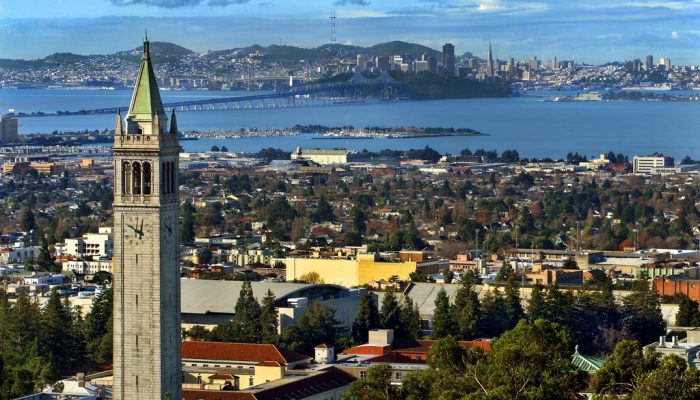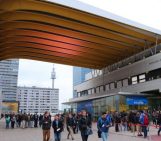
Credit: Roy Kaltschmidt
And we’re back! After a refreshing holiday (or was it?), the EGU GD Blog Team is ready to provide you with amazing blog posts once more! Although holidays can be great, one thing that can be even more great is a good summer school. Yep, you heard that correctly! Let me convince you to apply for the CIDER Summer School program next year.
Let’s start with the basics. What the hell is CIDER? Well, CIDER stands for the Cooperative Institute for Dynamic Earth Research. One of it’s main focusses is the interdisciplinary training of early career scientists. To that end, they organise a summer school every year (usually in June/July) that lasts for 4 weeks.
4 weeks?!
Again, you heard that correctly. You are very good at listening!
The first two weeks of the summer school are dedicated to getting up to speed on the topic of the summer school by means of lectures, tutorials, a little field trip, etc. During the last two weeks you will work together in groups on a project of your choosing. The projects are determined during the first two weeks, when you figure out where the knowledge gaps are and you start making teams (no worries, nobody will be left out). You will come up with possible project topics yourself, so you can imagine that there can be quite some lobbying going on to make sure your team gets sufficient members to pursue your favourite project!
Together with your team of students and postdocs, you will confer with established experts in the field to make your project a success. After two weeks, you can probably show some reasonable first results during the final presentation in front of everyone.
If you want to continue working on your project with your team afterwards, you can even write a small proposal to CIDER to request some funding to meet up again and turn your project into a paper. Although they can’t reimburse intercontinental flights, it is still a pretty awesome opportunity!
The topic of the summer school changes every year and alternates between a ‘deep’ topic and a ‘shallow’ topic. I attended the CIDER 2017 summer school with the topic ‘Subduction zone structure and dynamics‘ – a shallow topic. This year (2018), the topic was ‘Relating Geophysical and Geochemical Heterogeneity in the Deep Earth‘ – clearly a deep topic. If you want to know more about this year’s summer school, our Blog Reporter Diogo wrote about it here. Students from all kinds of different disciplines are encouraged to apply: geology, geochemistry, seismology, geodynamics, mineral physics, etc. The more diversity the better, because you need to learn from each other!
More/actual reasons to apply
Now that we have all the details out of the way, I can properly start to convince you to apply! Did I already mention that the summer school is in an exotic place in California, USA? In 2017, the summer school was in Berkeley and this year it was in Santa Barbara. These locations are always fixed, with the ‘shallow’ topics being held in Berkeley, and the deep topics being held in Santa Barbara. Maybe this can act as your guide for finding out which kind of topic to ultimately pursue in your career.
Also, can you imagine? Four weeks, in beautiful, sunny California for ‘work’? Because, yes, it is work, technically, but it won’t feel like it. Actually, it’s kind of like being transported to one of those American high school / college movies. Does anyone else watch those? Nope, just me? Okay then. You will get the full American student experience, as you will sleep in an actual dorm with all your fellow students and go to the dining hall religiously for breakfast, lunch, and dinner each day and every day! Yes, also in the weekends, because it’s free and you’re a poor student! Minor side-effect is that you want be able to look at – let alone stomach – burgers, fries, pizzas, and hotdogs for at least a year, but it’s totally worth it for this all-American movie-like experience. Obviously, sharing a dorm with all your fellow students and complaining about the food will forge bonds that will last far longer than the duration of the summer school and you are guaranteed to have a lot of fun during the summer school also after the lectures.
Although the program is pretty packed, you will have free evenings (during which you might catch up on your actual work) and you will have some days off during the weekends. Of course, you can’t have all weekend days off, because it wouldn’t be a proper summer school experience if you don’t return completely exhausted, right? However, on your precious days off, you can go and explore beyond the campus and do some nice day trips to a nearby city or nature reserve. You can of course also use your free evenings and weekends to sample some of the night life of whatever Californian city you are staying in!
My CIDER 2017 experience
I thoroughly enjoyed my own CIDER experience in Berkeley, 2017. I learned loads of things about subduction zones and a lot of my knowledge was refreshed, specifically on geochemistry, mineral physics and geology. It was great fun to live on an American campus (I mean, I really did feel as if I’d stumbled into an American teen movie) and we did some pretty cool things besides the summer school! There was a lovely field trip to learn a bit more about rocks and it was also a great opportunity to see something of the landscape and enjoy incredible views over San Francisco. Of course, San Francisco itself was also visited during one of our days off and I finally saw the Golden Gate bridge up close and ate crab at Fisherman’s Wharf. Unforgettable experience. Best day of the summer school. I cannot recommend it enough! We also went out for dinner and drinks on occasion in the city centre of Berkeley and we even snuck in a visit to the musical ‘Monsoon Wedding’ at Berkely Rep.
After the summer school, our project group applied for funding to meet up again (I just couldn’t get enough of the American vibe) and lo and behold, we actually got the funding! So this spring, I found myself in Austin, Texas, to work on our project.
Howdy y’all!
It was pretty amazing to have an opportunity like that, and I can assure you that we also had lots of fun in Austin. I mean, it’s Texas, what did you expect? I was already over the moon by the fact that I had the possibility of spotting men wearing cowboy boots for real and not just for carnival!
All in all, I can thoroughly recommend the CIDER summer school as a great learning experience and opportunity for meeting fellow scientists interested in your topic of choice.
Next year, the topic will be ‘Volcanoes‘, so if you have any interest in that, be sure to apply! There is also always a one-day pre-AGU workshop, where you can get a little taste of the summer school, as the progress on the projects of the previous year is reported and lectures anticipating the coming topic are held.
So, are you going to apply to CIDER next year? I mean, who doesn’t lava volcanoes?!




